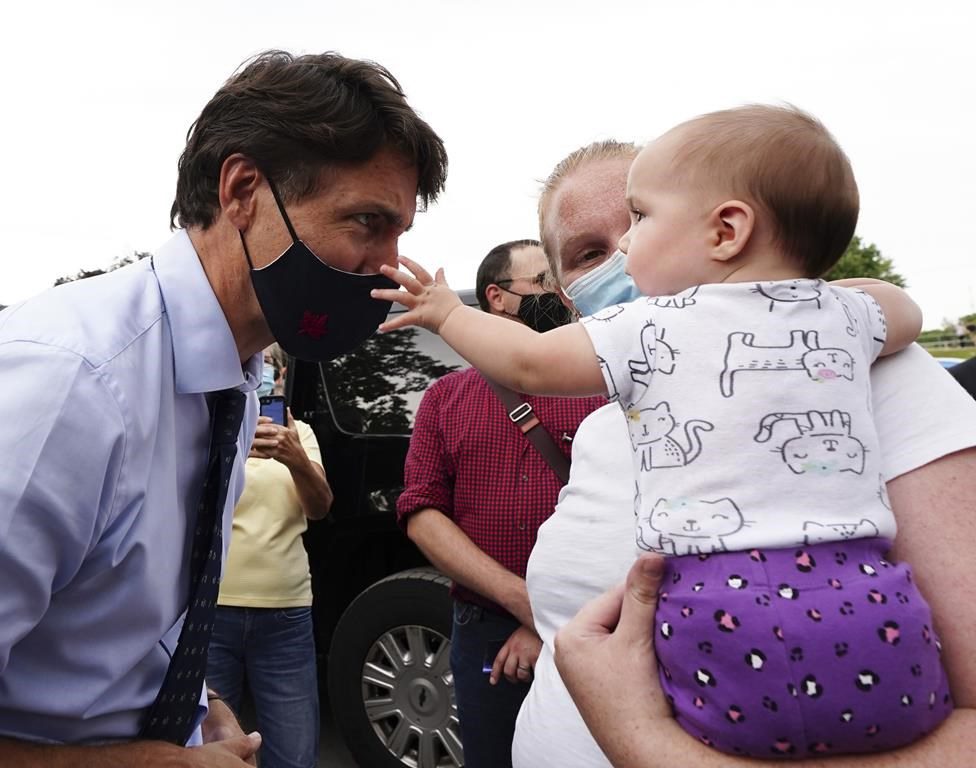Pestilence, infernos and the Taliban be damned – it’s time for Canada to head to the polls!
Prime Minister Justin Trudeau kept television camera operators in the capital bustling on Sunday, as he dragged his entire family to visit the Governor General at Rideau Hall, ahead of dragging Canadians to the voting booth next month.
For many people, the question was: why?
“Nobody wants an election before the end of this pandemic,” Trudeau insisted to reporters back in May. In fact, mere days before triggering the election, Trudeau claimed he wasn’t interested in playing politics and was too busy governing, precluding him from being able to devote a month to the campaign trail.
Fortunately for Trudeau, a 36-day availability miraculously appeared in his prime ministerial itinerary – the perfect duration for a general election! Despite months of assurance otherwise, Canadians would indeed be heading back to the polls.
Emerging from Rideau Hall and feeling the need to justify his change of heart, Trudeau delivered a speech that offered up the mushiest of pablum, claiming that this was perhaps “the most important [moment] since 1945 and certainly in our lifetimes.”
A curious, if ineffective, attempt at political spin. When it comes to the major issues, nothing has changed sufficiently to warrant an election.
To be fair, it wouldn’t boost a prime minister’s reputation to admit the election is a scheming attempt to acquire more power. But that is precisely what this election is about.
Canadians will mark their ballots on September 20th for three reasons. First, Trudeau misses the convenience of leading a majority government. Having to collaborate with other political parties is presumably just too much exertion for the inheritor of an Imperial Oil trust fund. Putting on boxing gloves and smashing the face of a Conservative Senator is one thing, but having to compromise with the opposition around the negotiating table? How tedious.
This is perhaps to be expected from the government that shot down its own electoral reform promise, as working with other parties would have become the norm rather than the exception under improved voting systems.
The second reason for next month’s election? Public opinion polls gaze favourably upon the Liberals, and perhaps more importantly, suggest the official opposition borders on a shambles. Both the Conservatives and Greens have embraced the curious hobby of self-cannibalism, with Erin O’Toole determined to be equally ineffective as his Tory predecessor. There’s no better time to strike than when your enemies flounder, fixed-election-date legislation be damned.
Third, history indicates that minority governments are rarely punished for calling an early election, even amidst a pandemic. Both the British Columbia New Democrats and the New Brunswick Progressive Conservatives called snap elections as minority governments last year, yet both were rewarded by voters with majority governments.
In fact, examples of minority governments punished for calling snap elections are incredibly scarce. Earl Washburn of EKOS Research asked on Twitter if anyone could provide any instances, and the best I could come up with – from both federal and provincial elections – was the Nova Scotia Progressive Conservatives losing a mere two seats in 2006. There didn’t look to be any examples from British politics, either.
If history suggests a snap election is rewarded, and timing is ideal in regards to the largely staggering opposition, perhaps the only mystery is why it wasn’t called earlier.
But other than Trudeau’s quest to amass greater power, there is no justification for an early election. Trudeau has enjoyed the confidence of the House of Commons, able to pass most legislation without hassle. And it’s been less than two years since voters last went to the polls.
Canadians do not fancy an early trip to the voting booth. It’s summer time, the fourth wave of the pandemic has begun to rear its fangs, much of the country is literally on fire, and honestly, many Canadians just don’t perceive a tangible connection between Parliament and their day-to-day lives at the best of times.
But as the world endures one crisis after another, what Canadians do crave is convincing, assuring leadership to navigate said problems. Climate change, a lingering pandemic, and housing affordability perch atop a litany of issues that require urgent and aggressive government intervention.
On Sunday, during a speech meant to curtail criticism as much as it was to inspire voters, Trudeau said, “The decisions your government makes right now will define the future your kids and grandkids will grow up in.”
He’s right. But many public opinion polls suggest that, at least on a personal level, it might not be Trudeau who Canadians prefer to shepherd them through such tumult.
For the NDP, whose leader is enjoying ballooning popularity, their challenge is to bridge the gap between Jagmeet Singh’s support and his party’s approval rating. And if they can, they might find next month the opportune moment to finally achieve what has proven elusive for them federally over nine decades: forming government.






